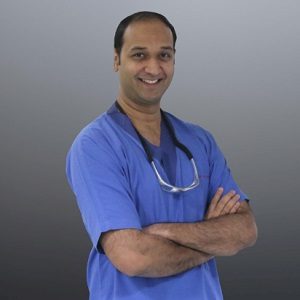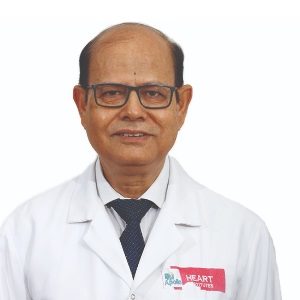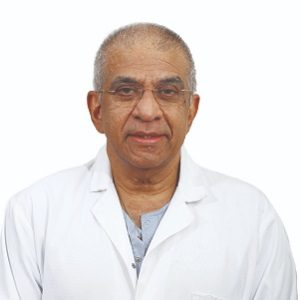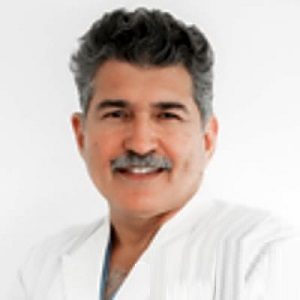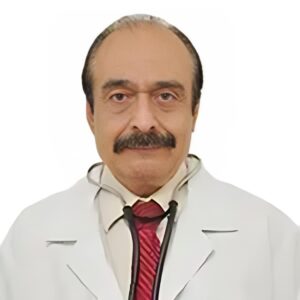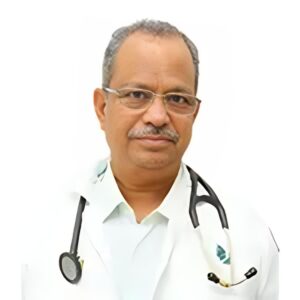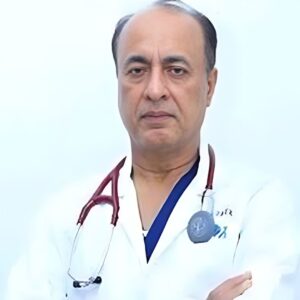Best Doctors for Aortic Aneurysm Surgery in India
- Interventional Cardiologist, Chennai, India
- Over 15 years’ experience
- Apollo Hospitals Greams Road
Profile Highlights:
- Dr. Sai Satish is a distinguished Senior Interventional Cardiologist affiliated with Apollo Hospitals in India, renowned for his pioneering contributions to the field of transcatheter valve therapies.
- His expertise extends internationally, as he also serves as a practicing interventional cardiologist and esteemed faculty member at the Gottsegen Institute of Cardiology in Budapest, Hungary, one of the world’s leading centers for TAVR (transcatheter aortic valve replacement) training.
- A trailblazer in the realm of minimally invasive cardiovascular procedures, Dr. Satish is celebrated for performing the highest number of percutaneous edge-to-edge mitral repairs (MitraClip implants) in the Indian subcontinent.
- Cardiac Surgeon, Cardiothoracic Surgeon, Vascular Surgeon, Chennai, India
- Over 35 years’ experience
- Apollo Hospitals Greams Road
Profile Highlights:
- Dr. Dillip Kumar Mishra is a well-known and experienced Cardiothoracic Surgeon in Chennai who has completed 35 years of specialized experience.
- The doctor gained experience working overseas in countries like Italy, Saudi Arabia, Bangladesh-Dhaka, and India.
- The doctor offers the best services to the patients, some of the prominent services include Intra – Arterial Thrombolysis, Mitral/Heart Valve Replacement, Cardio-Thoracic Surgery, bypass surgery, Radial Approach Angiography Balloon Mitral Valvuloplasty, etc.
- Cardiac Surgeon, Cardiothoracic Surgeon, Vascular Surgeon, Chennai, India
- Over 31 years’ experience
- Apollo Hospitals Greams Road
Profile Highlights:
- Dr. Vijay Shankar S is a senior cardio-thoracic Surgeon in Chennai having experience of more than 30 years in Cardiac Surgery.
- Dr. Vijay Shankar was a fellow Coronary Artery Surgery and Congenital Heart Surgery at the University of Wisconsin, USA.
- He provides consultation and diagnostic services for Mitral/Heart Valve Replacement, Cardiac Pacing, Invasive Cardiology, ABPM, Balloon Mitral Valvuloplasty, CT Angiography, etc.
- Cardiovascular Surgeon, Cardiac Surgeon, Gurugram, India
- Over 32 years’ experience
- Medanta-The Medicity, Gurgaon
Profile Highlights:
- Dr. Vijay Kohli is one of the best cardiac surgeons in India. He has brought an evolution in the spectra of Cardiac Surgery, wherein, he was the first leading surgeon to perform CABG on a beating heart in Kathmandu, Nepal.
- Vijay Kohli performed the first coronary artery bypass surgery in Jammu Medical College in 2001.
- Cardiologist
- Over 52 Years Experience
- Apollo Hyderabad
Profile Highlights:
- Dr. Sudhir Naik is a top cardiologist in Hyderabad and is among the most experienced doctors in the field.
- As a Senior Consultant of Cardiology at Apollo Health City, Hyderabad, Dr. Naik brings a plethora of experience to his profession.
- With an experience of over 52 years, Dr. Sudhir Naik stands as a well-renowned specialist who provides a range of treatments to address a variety of issues related to cardiology.
- Committed to providing complete cardiac care, Dr. Sudhir Naik specializes in treating ailments like chest pain, heart failure, hypertension, coronary artery disease, arrhythmia, etc.
- He is quite efficient in performing complex procedures like TAVR (Transcatheter Aortic Valve Replacement) and high-risk procedures like angioplasties.
- In addition to his clinical expertise, Dr. Sudhir Naik also stands as a prolific researcher. He has contributed to many national and international journals, demonstrating his dedication to the advancement of cardiac science.
- Cardiologist, Hyderabad, India
- Over 36 Years Experience
- Apollo Hyderabad
Profile Highlights:
- Dr. Badri Narayana Tumulu is one of the finest cardiologists in Hyderabad, with an extensive experience of over 36 years in the clinical field of Cardiology. Currently, Dr. Tumulu serves as a Senior Consultant in the department of Cardiology at Apollo Hospitals, Hyderabad.
- Dr. Tumulu’s commitment to improving cardiac care is seen by his work in cardiovascular disease management, preoperative care, and preventive measures.
- He brings forth a plethora of expertise and knowledge into his practice and treats a wide range of cardiac conditions including, Irregular Heartbeat, Dilated Cardiomyopathy, Barth Syndrome, Orthostatic Hypotension, Rheumatic Heart Disease, and much more. He also conducts multiple tests for coronary artery disease and valvular heart diseases.
- Additionally, he gives specialized treatment for chest pain that occurs during exercise, and also offers cardiac rehabilitation programmes.
- Dr. Badri Narayana Tumulu’s educational background is equally impressive as he holds various degrees such as MBBS, MD (Medicine), and DM (Cardiology). Apart from that, he is also known to contribute extensively on research papers on hypertension, women’s heart diseases, etc.
- Throughout his distinguished career, Dr. Tumulu has received several honors, such as the Mega Excellency Award (2016), the National Integration Award (2016), and the esteemed Navaratna Award (2016). In addition, he is the Founder and Chairperson of the BASE Vision Foundation (BVF), which validates his dedication to community service and high-quality healthcare.
- By maintaining his unrelenting dedication to perfection, Dr. Badri Narayana Tumulu keeps raising the bar in the field of Cardiology and making sure his patients have the best possible heart health.
- Cardiologist, Hyderabad, India
- Over 40 Years Experience
- Apollo Hyderabad
Profile Highlights:
- Dr. Venkata Rayudu Nekkanti is one of Hyderabad’s most experienced cardiologists, having been practiced for over 40 years.
- Presently practicing as a Senior Consultant in the Dept. of Cardiology at the Apollo Health City, Hyderabad, Dr. Nekkanti offers his patients with unmatched attention and care.
- He specializes in treating many cardiac disorders such as Heart Failure, Aortic Aneurysm, Hypertension, Myocardial Infarction (Heart Attack), and Coronary/Peripheral Artery Disease among several others.
- Dr. Nekkanti is also well known for his expertise in performing complicated and high-risk procedures such as Coronary Stent Implantation, Pacemaker, Implantable Cardioverter Defibrillator (ICD) implantations, and Angioplasties.
- Throughout his illustrious career, Dr. Nekkanti has received several honors, including the esteemed Govt. of Andhra Pradesh’s Best Service Award for pioneering the first Coronary Angioplasty in India.
- In addition, the Indian Academy of Echocardiography awarded him the Best Paper Award, and the Indian Society of Echo Cardiography honored him for his outstanding research on Complex Aortic Plaques in Cryptogenic Stroke in 2011.
- Due to his extensive training, kind demeanor, and commitment to promoting heart health and well-being, patients trust him and feel at ease with him.
- Cardiologist, Hyderabad, India
- Over 35 Years Experience
- Apollo Hyderabad
Profile Highlights:
- With more than 35 years of experience, Dr. Pratap Chandra Rath is one of Hyderabad’s leading cardiologists.
- Dr. Pratap Chandra Rath extends his expertise as a Senior Consultant Cardiologist & Director of Interventional Cardiology at Apollo Health City, Hyderabad where he provides comprehensive services to address a variety of cardiology disorders like Barth Syndrome, Dilated Cardiomyopathy, Irregular Heartbeat, Orthostatic Hypotension, Patent foramen ovale, and many more.
- His areas of expertise are lies in complex, high-risk angioplasties and image-guided techniques such as OCT/IVUS.
- Over the course of his career, Dr. Rath has performed over 100,000 Angiograms, 50,000 PTCA and Stenting, 200 Percutaneous Trans Myocardial Laser Revascularizations (PTMR), 5,000 Valvuloplasties, and 1,000 peripheral, renal, and carotid interventions—including ASD and PDA closures.
- Apart from his medical excellence, Dr. Pratap Chandra Rath has also achieved several groundbreaking accomplishments. In 1994, he became the first person in the Asia Pacific area to execute TransRadial Coronary Angioplasty and stenting; this achievement was recorded in the Indian Heart Journal and the Limca Book of World Records. According to the Indian Heart Journal, he was also the first in India to do venous graft operation with a protective device.
Best Hospitals for Aortic Aneurysm Surgery in India
Abdominal Aortic Aneurysm (AAA)
Abdominal Aortic Aneurysm (AAA) is the inflammation or swelling of the aorta which is the largest artery of the body. Large aneurysms are rare but are fatal if they burst. It runs from the heart to the abdomen through the chest and is the largest vessel in the human body. A rupture of the AAA can cause bleeding that may be life-threatening.
Types of Abdominal Aortic Aneurysm
The size and the speed of growth of an Aneurysm are the key factors for the classification.
- Small (<5.5 cm): These are slow-growing Abdominal Aortic Aneurysms with a comparatively lesser risk of rupturing than the larger aneurysms. Regular abdominal ultrasounds are often helpful in monitoring these aneurysms.
- Large (>5.5 cm): These are fast-growing Abdominal Aortic Aneurysms that have high chances of rupturing. There might be internal bleeding due to rupture followed by other major complications. The larger the size of the aneurysm, the higher the chances of treating the same through the surgery.
Symptoms of Abdominal Aortic Aneurysm
In most cases, a small abdominal aortic aneurysm shows no symptoms. However, a larger AAA may cause pain or a pulsating feeling in the abdomen & persistent back pain. As it grows slowly without showing any visible symptoms, it is often difficult to detect an Abdominal Aortic Aneurysm. While some aneurysms stay small without any rupture, many others grow large.
They may notice a few symptoms if they have an Abdominal Aortic Aneurysm that continues to enlarge. These symptoms may include back pain, deep and persistent pain in the abdomen, and a pulsating feel near the belly button. It also includes clammy skin, nausea, shock, and vomiting.
A ruptured abdominal aortic aneurysm may cause:
- Dizziness
- Sweaty skin
- Rapid heartbeat
- Shortness of breath
- Loss of consciousness
Causes & risk factors of Abdominal Aortic Aneurysm
- Age: Increasing age is a risk factor for abdominal aortic aneurysms.
- Gender: AAAs are most common in men aged over 65.
- Smoking: Tobacco contains substances that damage the aortic wall.
- Atherosclerosis: In atherosclerosis, there is the narrowing of the arteries due to the accumulation of plaque. These plaques cause the widening of the aorta so that the blood keeps on flowing leading to the weakening of the aorta.
- High blood pressure: It increases the pressure on aortic walls. This may weaken the walls of the aorta and cause damage to the same.
- Family history: Having a family history of AAA may increase the risk of developing it.
- Infection in the aorta: A fungal or bacterial infection may cause an Abdominal Aortic Aneurysm.
- Blood vessel diseases: Some diseases may cause inflammation in the blood vessels.
- Trauma: An injury or trauma may also cause an Abdominal Aortic Aneurysm.
Risk factors for Abdominal Aortic Aneurysm
- Family history: If you have a family history of an Abdominal Aortic Aneurysm, you are at an increased risk of developing the condition.
- Tobacco use: Tobacco consumption can increase your chances of developing an Abdominal Aortic Aneurysm.
- Color complexion: People with white or fair color complexion have a risk of developing abdominal aortic aneurysms.
- Other types of aneurysm: If you have an aneurysm in some other blood vessel, it may increase your risk for Abdominal Aortic Aneurysm.
Diagnosis of Abdominal Aortic Aneurysm
Routine physical examination
Abdominal MRI
Ultrasound
Abdominal CT scan
Treatment options for Abdominal Aortic Aneurysm
Medical monitoring
Treatment of Large AAA
Endovascular surgery
During endovascular surgery, a small incision is made in the groin through which a graft made of metal mesh is inserted & advanced to the swollen aorta. This graft is sealed to the aortic wall at both ends which reduces the risk of bursting.
Open surgery
Treatment of small or medium AAA
For a small (3.0-4.4cm) or medium (4.5-5.4cm) aneurysm, surgery may not be recommended as it may not benefit the patient. The patient is called for regular check-ups (every year in case of a small aneurysm and every three months in case of a medium aneurysm) & scans to monitor the size of the aneurysm.
The patient is advised to prevent the aneurysm from getting bigger, which is done by:
- Stopping smoking
- Eating a balanced diet
- Maintaining a healthy weight
- Regular exercise
Complications of Abdominal Aortic Aneurysm
A ruptured aneurysm or aortic dissection (or tear) in the layers of the Aortic wall are the major complications. The larger the size and speed of growth of the aneurysm, the higher are the chances of Aneurysm rupture which may cause bleeding, which is life-threatening.
You will realize a ruptured aneurysm if you have low blood pressure, sudden and continuous abdominal pain, or a faster pulse. A tearing sensation or back pain also signifies the rupture of an aneurysm.
Prevention Of Abdominal Aortic Aneurysm
There are various ways of preventing and worsening Abdominal Aortic Aneurysm. These, does not limit to but, may include:
- Quitting the consumption of tobacco and smoking may help prevent aneurysms.
- Maintain normal blood pressure and cholesterol by following the instructions of the doctor.
- Eating a healthy and balanced diet that includes fruits and vegetables is also helpful.
- Exercising regularly with the right activities advised by the doctor may also help prevent aneurysms.

